The water testing kit is a powerful and indispensable tool designed to assess and analyze the quality of water in various settings. It serves as a reliable means of evaluating crucial parameters that impact water safety, purity, and suitability for specific purposes. This versatile kit finds application in a wide array of fields, from environmental monitoring and public health to industrial processes and research endeavors. Let’s explore the key components and functions of a typical water testing kit:
- Parameter Measurement:
A standard water testing kit is equipped to measure essential parameters that define water quality. These may include:
- pH Level: pH determines the acidity or alkalinity of water, influencing its suitability for different uses, such as drinking, irrigation, and industrial processes.
- Dissolved Oxygen (DO): DO is critical for aquatic life and serves as an indicator of water’s health and ability to support living organisms.
- Turbidity: Turbidity assesses the clarity of water by measuring the presence of suspended particles, providing insights into water purity and the effectiveness of treatment processes.
- Total Dissolved Solids (TDS): TDS indicates the concentration of dissolved substances in water, impacting taste, mineral content, and the potential for scale formation.
- Chlorine Concentration: Chlorine is commonly used for disinfection in water treatment, and its concentration needs to be monitored to ensure safe levels for consumption



Application of the Water Testing Kit :
The water testing kit finds application in various fields:
- Drinking Water: It enables individuals and organizations to test the quality of tap or well water, ensuring it meets safety standards for consumption.
- Environmental Monitoring: The kit aids in assessing water bodies like rivers, lakes, and oceans to monitor pollution levels, identify contaminants, and support ecological preservation efforts.
- Swimming Pools and Spas: Regular testing of pool water ensures that chlorine and pH levels are balanced, promoting a hygienic and safe swimming environment.
- Agricultural and Irrigation: Farmers use water testing kits to assess the suitability of water for irrigation, preventing potential damage to crops and soil.
- Industrial Processes: Industries employ the kit to monitor water used in manufacturing processes, helping them maintain efficiency and comply with environmental regulations.
- Educational and Research Use: Educational institutions and research facilities utilize water testing kits to conduct experiments, understand water quality dynamics, and promote environmental awareness.
Use of the Testing Kit:
Modern water testing kits are designed to be user-friendly, making them accessible to a wide range of users, including professionals, students, and the general public. They typically come with clear instructions and pre-packaged reagents for specific tests, simplifying the process of data collection and analysis.
Conclusion:
The water testing kit stands as a critical instrument in the ongoing effort to safeguard water resources and human health. By enabling accurate measurement of various water parameters, it empowers individuals and organizations to make informed decisions about water usage, treatment, and conservation. Whether in the realms of public health, environmental preservation, or industrial processes, the water testing kit remains an indispensable tool in our collective quest for a sustainable and thriving water future.
Frequently Asked Questions
What is a water testing kit?
Answer: A water test kit is a collection of tools and reagents designed to assess the quality of water by measuring various parameters that determine its suitability for specific purposes.
What parameters can a water testing kit measure?
Answer: A typical water test kit can measure parameters such as pH levels, dissolved oxygen (DO), turbidity, total dissolved solids (TDS), chlorine concentration, and more.
Why is it essential to test water quality?
Answer: Testing water quality is crucial to ensure that water is safe for human consumption, supports aquatic life, and complies with environmental regulations.
Who uses water testing kits?
Answer: Water test kits are used by individuals, environmentalists, researchers, industries, agriculturalists, and public health authorities, among others.
How do water testing kits work?
Answer: Water test kits utilize specific chemical reagents and colorimetric methods to react with water samples and produce color changes or readings, which are then compared to reference charts for parameter quantification.
What are some common applications of water testing kits?
Answer: Water test kits are employed in various applications, including testing drinking water, monitoring environmental water bodies, maintaining swimming pool water quality, assessing agricultural irrigation water, and ensuring compliance with industrial water quality standards.
Are water testing kits easy to use?
Answer: Yes, most modern water test kits are designed to be user-friendly, with clear instructions and pre-packaged reagents, making them accessible to both professionals and the general public.
Can water testing kits detect contaminants in water?
Answer: Yes, water test kits can detect contaminants such as bacteria, heavy metals, pesticides, and nitrates, depending on the specific kit and the tests it offers.
How often should water be tested using a water testing kit?
Answer: The frequency of water testing depends on factors like the water source, intended use, and local regulations. Generally, drinking water should be tested at least annually, while swimming pools may require more frequent testing.
What are the benefits of using a water testing kit?
Answer: Using a water test kit empowers individuals and organizations to identify potential issues with water quality promptly. It allows for informed decision-making regarding water treatment, conservation, and protection of public health and the environment.

